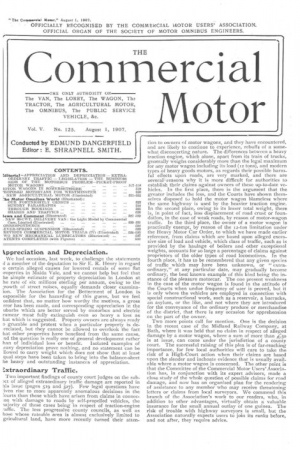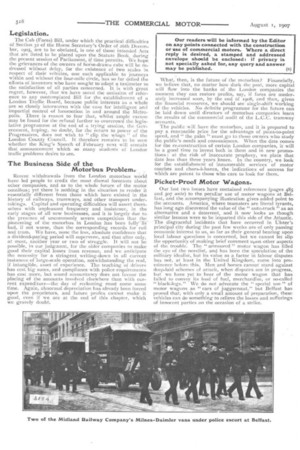kppreciation and Depreciation.
Page 1

Page 2

If you've noticed an error in this article please click here to report it so we can fix it.
We had occasion, last week, to challenge the statements pf a member of the deputation to Sir E. R. Henry in regard o certain alleged causes for lowered rentals of some flat Properties in Maida Vale, and we cannot help but feel that he simple estimate of property depreciation in London at he rate of six millions sterling per annum, owing to the ;rowth of street noises, equally demands closer examinaion. The Association for the Betterment of London is esponsible for the hazarding of this guess, but we feel onfident that, no matter how worthy the motives, a gross rror has been made, and corresponding appreciation in the uburbs which are better served by motorbus and electric ramcar must fully extinguish even so heavy a loss as hat which is suggested. Property owners are always ready o grumble and protest when a particular property is dereciated, but -they cannot be allowed to overlook the fact hat other properties have benefited from the same cause, nd the question is really one of general development rather han of individual loss or benefit. Isolated examples of navy depreciation prove nothing, and no statement can be Rowed to carry weight which does not show that at least qual steps have been taken to bring into the balance-sheet he heavy and outstanding instances of appreciation.
:xtraordinary Traffic.
Two important findings of county court judges on the sub?et of alleged extraordinary traffic damage are reported in his issue (pages 519 and 527). Few legal questions have ken rise to more apparently anomalous decisions in the ;ourts than those which have arisen from claims in connecon with damage to roads by self-propelled vehicles, the iajority of these cases being in respect of traction-engine -affic. The less progressive county councils, as well as hose whose rateable area is almost exclusively limited to gricultural land, have more recently turned their atten Lion to owners of motor wagons, and they have encountered, and are likely to continue to experience, rebuffs of a somewhat disconcerting nature. The differences between a heavy traction engine, which alone, apart from its train of trucks, generally weighs considerably more than the legal maximum for any motor wagon including its load (12 tons), and modern types of heavy goods motors, as regards their possible harmful effects upon roads, are very marked, and there are several reasons why it is more difficult for authorities to establish their claims against owners of these up-to-date vehicles. In the first place, there is the argument that the greater includes the less, and the Courts have shown themselves disposed to hold the motor wagon blameless where the same highway is used by the heavier traction engine. In the second place, owing to its lesser total weight, there is, in point of fact, less displacement of road crust or foundation, in the case of weak roads, by reason of motor-wagon traffic. In the third place, the owner of a motor wagon is practically exempt, by reason of the 12-ton limitation under the Heavy Motor Car Order, to which we have made earlier reference, from claims which are based upon alleged excessive size of load and vehicle, which class of traffic, such as is provided by the haulage of boilers and other exceptional weights, accounts for so large a percentage of claims against proprietors of the older types of road locomotives. In the fourth place, it has to be remembered that any given species of traffic which may have been unknown, or " extraordinary," at any particular date, may gradually become ordinary, the best known example of this kind being the instance of the pleasure motorcar. The one present weakness in the case of the motor wagon is found in the attitude of the Courts when undue frequency of user is proved, but it is only where the vehicles are employed in connection with special constructional work, such as a reservoir, a barracks, an asylum, or the like, and not where they are introduced for the conveyance of the ordinary produce or merchandise of the district, that there is any occasion for apprehension on the part of the owner.
Two more points call for mention. One is the decision in the recent case of the Midland Railway Company, at Bath, where it was held that no claim in respect of alleged damage by a motor wagon, where a sum of more than 4-so is at issue, can come under the jurisdiction of a county court. The successful raising of this plea is of far-reaching importance, for few local authorities will care to take the risk of a High-Court action when their claims are based upon the slender and inchoate evidence that is usually available where a motor wagon is concerned. The other point is that the Committee of the Commercial Motor Users' Association has, in conjunction with its expert advisers, made a close study of the whole question of possible claims for road damage, and now has an organised plan for the rendering of assistance to any member who may receive threatening letters or claims from local surveyors. We commend this branch of the Association's work to our readers, who, in addition to other advantages, virtually obtain a valuable insurance for the small annual outlay of one guinea. The risk of trouble with highway surveyors is small, but the Association naturally expects users to join its ranks before, and not after, they require advice.
Legislation.
The Cab (Fares) Bill, under which the practical difficulties of Section 32 of the Horne Secretary's Order of 26th December, ryo5, are to be obviated, is one of those intended Acts that are listed to be placed upon the Statute Book, during the present session of Parliament, if time permits. We hope the grievances of the owners of horse-drawo cabs will be redressed without delay, for the existence of two scales in respect of their vehicles, one each applicable to journeys within and without the four-mile circle, has so far defied the efforts of inventors who have sought to adapt a taximeter to the satisfaction of all parties concerned. It is with great regret, however, that we have noted the omission of reference to any contemplated Bill for the establishment of a London Traffic Board, because public interests as a whole are so closely interwoven with the case for intelligent and impartial control of locomotion in and around the Metropolis. There is reason to fear that, Whilstample excuse may be found for the refusal further to overcrowd the legislative programme at the end of a trying session, the Government, hoping, no doubt, for the return to power of the Progressives, does not wish. to " clip the wings " of the London County Council. It therefore remains to be seen whether the King's Speech of February next will contain that announcement which so many students of London traffic problems desire to see.
The Business Side of the Motorbus Problem.
Recent withdrawals from the London motorbus world have led people to credit the most dismal forecasts about other companies, and as to the whole future of the motor omnibus; yet there is nothing in the situation to render it essentially different from those which have existed in the history of railways, tramways, and other transport undertakings. Capital and operating difficulties will assert themselves with unpleasant frequency and insistence, in the early stages of all new businesses, and it is largely due to the presence of uncommonly severe competition that the pioneering of the motorbus in London has been fully bad, if not worse, than the corresponding records for rail and tram. We have, none the less, absolute confidence that a dividend-paying period will supervene, and that after only, at most, another year or two of struggle. It will not be possible, in our judgment, for the older companies to make good their capital losses from revenue, and we anticipate the necessity for a stringent writing-down in all current instances of large-scale operation, notwithstanding the real, if intangible, asset of experience. The teaching of drivers has cost big sums, and compliance with police requirements has cost more, but sound accountancy does not favour the placing of the amounts involved elsewhere than with current expenditure—the day of reckoning must come some time. Again, abnormal depreciation has already been forced upon the proprietors, and future profits cannot make it good, even if we are at the end of this chapter, which we gravely doubt. What, then, is the future of the motorbus? Financially, we believe that, no matter how dark the past, more capital will flow into the banks of the London companies the moment they can restore profits, say, if fares are moderately increased soon, by the end of 1908, and then, given the financial resources, we should see single-shift working of the vehicles. No definite programme for the future can be laid down until directors of motorbus companies learn the results of the commercial audit of the L.C.C. tramway accounts.
The public will have the motorbus, and it is prepared to pay a reasonable price for the advantage of point-to-point speed, and " the palm" must go to those owners who study the public's needs and conveniences. When the date comes for the re-construction of certain London companies, it will be a good time to invest both in theta and in new promotions: at the risk of inaccurate prophecy, we place that date less than three years hence. In the country, we look for the establishment of innumerable services of motor coaches and chars-a-bancs, the indications of success for which are patent to those who care to look for them.
Picket-Proof Motor Wagons.
Our last two issues have contained references (pages 485 and 507 ante) to the peculiar use of motor wagons at Belfast, and the accompanying illustration gives added point to the accounts. America, where teamsters are literal tyrants, has long ago discovered the value of the" auto-truck" as an alternative and a deterrent, and it now looks as though similar lessons were to be imparted this side of the Atlantic. The disgraceful incidents that have occurred in Ulster's principal city during the past few weeks are of only passing economic interest to us, so far as their general bearing upon local labour questions is concerned, but we cannot let slip the opportunity of making brief comment upon other aspects of the trouble. The " armoured " motor wagon has filled the eye of the novelist, and has been the speculation of the military idealist, but its value as a factor in labour disputes has not, at least in the United Kingdom, come into prominence before this. Men and horses cannot stand against deep-laid schemes of attack, when disputes are in progress, but we have yet to hear of the motor wagon that has failed to convey its load of fuel, merchandise, or so-called " black-legs." We do not advocate the " special use " of motor wagons as "cars of juggernaut," but Belfast has proved that, with only a small amount of preparation, these vehicles can do something to relieve the losses and sufferings of innocent parties on the occasion of a strike.


























